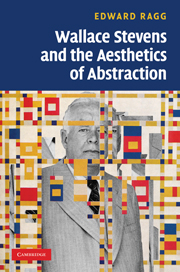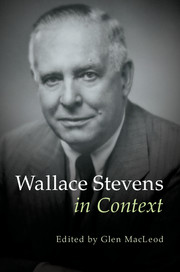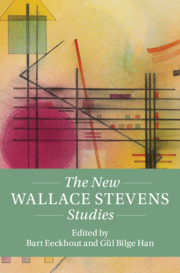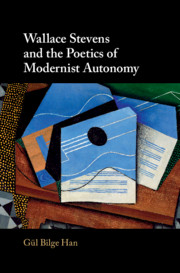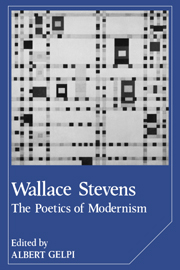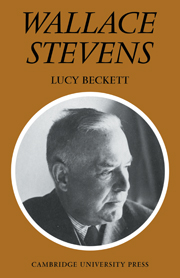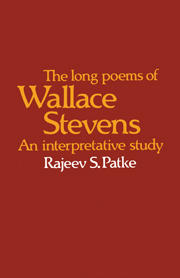Wallace Stevens and the Aesthetics of Abstraction
$120.00 (C)
- Author: Edward Ragg, Tsinghua University, Beijing
- Date Published: August 2010
- availability: Available
- format: Hardback
- isbn: 9780521190862
$
120.00
(C)
Hardback
Other available formats:
eBook
Looking for an examination copy?
This title is not currently available for examination. However, if you are interested in the title for your course we can consider offering an examination copy. To register your interest please contact [email protected] providing details of the course you are teaching.
-
Edward Ragg's study is the first to examine the role of abstraction throughout the work of Wallace Stevens. By tracing the poet's interest in abstraction from Harmonium through to his later works, Ragg argues that Stevens only fully appreciated and refined this interest within his later career. Ragg's detailed close-readings highlight the poet's absorption of late nineteenth century and early twentieth century painting, as well as the examples of philosophers and other poets' work. Wallace Stevens and the Aesthetics of Abstraction will appeal to those studying Stevens as well as anyone interested in the relations between poetry and painting. This valuable study embraces revealing philosophical and artistic perspectives, analyzing Stevens' place within and resistance to Modernist debates concerning literature, painting, representation and ‘the imagination'.
Read more- Written in a clear accessible way
- Provides a wide-ranging bibliography of Stevens' work
- Unique study in the role of abstraction in the work of Wallace Stevens, providing the reader with new perspectives on how these texts can be interpreted
Awards
- A Choice Outstanding Academic Title, 2011
Reviews & endorsements
"Ragg's book shows what can be done by scrupulous scholarship on a carefully chosen and crucial individual feature of a poet's oeuvre. Ragg brings to the topic of abstraction an enviable combination of elegant clarity, subtle and imaginative readings, the construction of an engaging and rich dialectic within Stevens' own career and incisive philosophical analysis that provides a significant conceptual place for the role of idealization in poetry."
Charles Altieri, University of California, BerkeleySee more reviews"Edward Ragg's Wallace Stevens and the Aesthetics of Abstraction is a major contribution to Stevens studies. Ragg is an internationally renowned Stevens expert. In this book he approaches head on the vexed question of ‘abstraction' in Stevens' poetry. As Ragg shows, Stevens' notions of abstraction and his practice of ‘the aesthetics of abstraction' evolved over the years, from book to book of poetry and from essay to essay as he tried to account in the latter for his poetic practice. The evolution was an attempt to strike the right balance between abstraction and reference to things, 'the pans above the stove, the pots on the table, the tulips among them'. Particularly valuable is the detailed account of Stevens' tendency to abandon the specific idiom of abstraction that dominates the poetry of the early 1940s and its replacement as the decade wore on with a poetry that is still abstract but no longer so much uses just one repertoire of terms. Dr Ragg's investigation is carried on by way of brilliant close reading of difficult poems, for example the admirable readings of ‘Montrachet-Le-Jardin' and ‘The Pure Good of Theory'. Anyone interested in Stevens' poetry should have this superb book."
J. Hillis Miller, University of California, Irvine"Ragg's is the rare book that combines intellectual rigor with literary sensitivity in all areas, harmonizing the discussion of ideas and debates with well-informed, multifaceted, and sensitive readings of poems. 'It Must Bring Pleasure'. And it does."
Beverly Maeder, The Wallace Stevens Journal"… explores the abstract nature of Stevens' writing … I consider Ragg's book an important contribution to literary criticism."
Gerardo Del Guercio, Journal of the American Studies Association of Texas"Ragg's book represents a new stage in Stevens criticism, after the aestheticism of the pre-1970 period, the philosophical emphasis of 1970–90 (Joseph Riddel, Harold Bloom, and J. Hillis Miller), and the historicism of 1990–2010 (Alan Filreis and James Longenbach). [Ragg] does not forswear history or philosophy. But he embeds them in a careful consideration of how Stevens actually thought: the aesthetics here are not generic but concertedly Stevens's own. The author reveals much about what Stevens read and did, but he also undertakes ambitious readings, such as a highly productive quibble on whether the 'le' in 'Montrachet-le-Jardin' should be capitalized and a bravura exegesis of 'The Pure Good of Theory', a middle-late poem that Ragg elucidates to its full potential. He lauds Stevens's approval of the 'second-rate' … which allows for a 'bourgeois abstraction' in which the ordinary and exotic are not strangers. Though, as Ragg observes, Stevens himself was not second-rate, cultivating the second-rate enabled him to achieve his 'resourcefully abstract' style in a way that experiencing only the best art would not have. Only the philosopher Simon Critchley has shed as much new light on Stevens as Ragg here does. Summing up: highly recommended. Upper-division undergraduates through faculty."
N. Birns, Choice"Ragg's work has garnered much deserved praise, and it will be of use both to readers of Stevens and to anyone working on the relationship between poetry and painting … Ragg's work is exceptionally well done … and his claim for the central importance of painterly abstraction in the development of Stevens' poetics is established compellingly. The majority of Ragg's focus falls on Stevens' works from 1923 to 1945, and the close analysis he offers of 'Landscape with Boat' from Parts of a World … is particularly useful for the classroom as well as scholarship. This reviewer has used Ragg's approach for seminars with good effect, and this may be the lasting contribution of his work. Instructors teaching Stevens' poetry will find [this] a highly useful resource during lecture preparation, especially given Ragg's tendency to move from critical assertions to the accumulation of evidence through extensive close reading."
James Gifford, The Year’s Work in English Studies"[This book] is tightly argued throughout, drawing upon Stevens' essays and letters to illustrate the poet's engagement with modernist art theory and philosophy, and to map his evolving sense of an abstract aesthetic … Ragg makes a particularly strong case for considering Stevens' gustatory imagination. Ever alert to the pleasures of eating and drinking in Stevens' poetry, [he] argues that the physical and sensual 'are often the sites for the catalysis of his abstract imagination', adding that 'the tendency to oppose the sensual to the abstract denies readers insight into this aspect of Stevens' work'."
Alex Runchman, Irish Journal of American StudiesCustomer reviews
Not yet reviewed
Be the first to review
Review was not posted due to profanity
×Product details
- Date Published: August 2010
- format: Hardback
- isbn: 9780521190862
- length: 262 pages
- dimensions: 229 x 152 x 16 mm
- weight: 0.52kg
- availability: Available
Table of Contents
Acknowledgments
List of abbreviations
Introduction: 'Stevensian' and the question of abstraction 1935–2009
1. The abstract impulse: from anecdote to 'new romantic' in Harmonium (1923) and Ideas of Order (1935)
2. The turn to abstraction: Owl's Clover (1936) and the 'un-locatable' speaker in The Man with the Blue Guitar (1937)
3. The 'in-visible' abstract: Stevens' idealism from Coleridge to Merleau-Ponty
4. Abstract figures: the curious case of the idealist 'I'
5. Abstract appetites: food, wine and the idealist 'I'
6. The pure good of theory: a new abstract emphasis
7. Bourgeois abstraction: poetry, painting and the idea of mastery in late Stevens.
Sorry, this resource is locked
Please register or sign in to request access. If you are having problems accessing these resources please email [email protected]
Register Sign in» Proceed
You are now leaving the Cambridge University Press website. Your eBook purchase and download will be completed by our partner www.ebooks.com. Please see the permission section of the www.ebooks.com catalogue page for details of the print & copy limits on our eBooks.
Continue ×Are you sure you want to delete your account?
This cannot be undone.
Thank you for your feedback which will help us improve our service.
If you requested a response, we will make sure to get back to you shortly.
×
